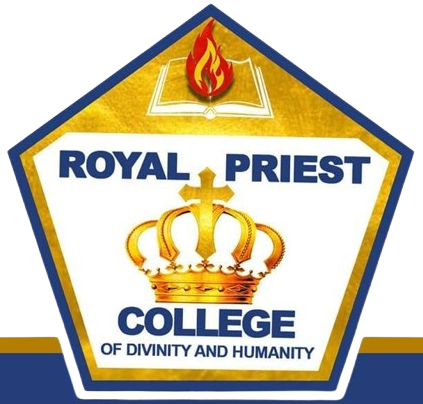CALL US NOW: (+233) 055 551 5232
Our Foundational Values
Guiding Principles That Shape Our Mission, Vision, and Commitment to Excellence

The foundational values of the Royal Priest College of Divinity and Humanity are rooted in the belief that all believers are called to be priests who serve God and others. This concept is based on the biblical teaching found in 1 Peter 2:9, which describes believers as a “chosen race, a royal priesthood, a holy nation, a people for his own possession.” The college emphasizes the importance of equipping individuals to fulfill their priestly duties by teaching them to study and apply the Word of God (2 Timothy 2:15), to live lives of holiness and service (Romans 12:1-2), and to proclaim the gospel to the world (Matthew 28:19-20). Additionally, the college values the unity of believers from all nations and backgrounds, as seen in Revelation 7:9, which describes a great multitude from every nation, tribe, people, and language worshiping before the throne of God. Thus, the Royal Priest College of Divinity and Humanity seeks to train individuals to live out their priestly calling in a way that glorifies God and advances His kingdom on earth.

THE MONARCHY AND SOVEREIGNTY OF GOD
The monarchy and sovereignty of God are foundational truths in the Christian faith. Scripture affirms that God is the supreme ruler over all creation, exercising His authority and control over every aspect of the universe (Psalm 103:19, Daniel 4:35). God’s sovereignty is demonstrated in His ability to govern and orchestrate events according to His divine will (Ephesians 1:11, Romans 9:21).
The concept of God’s monarchy highlights His absolute power and authority as the King of kings and Lord of lords (1 Timothy 6:15). This sovereignty extends to every detail of our lives, including our salvation and redemption (Romans 8:28-30, Ephesians 1:4-5).
Understanding and embracing the monarchy and sovereignty of God should lead us to humility, trust, and obedience. We can find comfort and security in knowing that God is in control, even when circumstances seem uncertain or chaotic (Proverbs 19:21). Ultimately, God’s sovereignty should inspire us to worship Him and submit to His divine rule, recognizing that He alone is worthy of all glory and honor (Revelation 4:11).

SEEKING FIRST THE KINGDOM OF GOD
Seeking first the kingdom of God is a foundational principle for Royal Priest College of Divinity and Humanity, as taught in Matthew 6:33 where Jesus says, “But seek first the kingdom of God and his righteousness, and all these things will be added to you.” This means prioritizing God’s rule and reign in our lives, seeking to align our thoughts, actions, and desires with His will above all else.
This involves seeking God’s glory and the advancement of His kingdom above our own personal ambitions or desires. It requires a radical reorientation of our hearts and minds towards God and His purposes, putting Him first in all areas of our lives.
As believers, we are called to seek the kingdom of God in everything we do, whether it be in our work, relationships, or ministry. This means living out our faith in a way that reflects God’s values and priorities, and actively participating in spreading the good news of the gospel to others.
Ultimately, seeking first the kingdom of God is about surrendering our will to His, trusting in His provision and guidance, and acknowledging His sovereignty over all aspects of our lives.

KEEPING AND PRACTICING THE ROYAL LAW
Keeping and practicing the Royal Law, as outlined in James 2:8-9, is essential for believers in Christ. This law, often referred to as the “law of love,” commands us to love our neighbor as ourselves. This means treating others with kindness, compassion, and respect, regardless of their background or circumstances.
As Christians, we are called to demonstrate our faith through our actions, not just our words (James 2:14-17). This includes caring for the poor and needy, standing up for justice and righteousness, and showing mercy and forgiveness to those who have wronged us (Matthew 5:7, Micah 6:8).
Ultimately, keeping and practicing the Royal Law is a reflection of our love for God and our desire to follow His commandments (John 14:15). By obeying this law, we demonstrate our commitment to living out the gospel in our daily lives and fulfilling the greatest commandments to love God and love others (Matthew 22:37-40).

ADVOCATE FOR UNITY OF ALL BELIEVERS IN GOD
The Bible teaches the importance of unity among believers in God. In Ephesians 4:3, it states, “Make every effort to keep the unity of the Spirit through the bond of peace.” This unity is not based on uniformity of beliefs or practices, but rather on the common belief in Jesus Christ as Lord and Savior.
Jesus prayed for unity among believers in John 17:20-23, expressing His desire for all believers to be one, just as He and the Father are one. This unity is a powerful witness to the world of the love of God and the truth of the gospel.
While there may be differences in secondary theological beliefs among Christians, it is vital to focus on the essentials of the faith and strive for unity in these core beliefs. Romans 15:5-6 encourages believers to live in harmony with one another, with one mind and one voice, glorifying God together.
Therefore, it is important for all believers to advocate for unity among Christians, recognizing that we are all part of the body of Christ and called to love one another as Christ has loved us (John 13:34-35).

REWARDING AND HONORING GOOD LEADERSHIP AND HUMANITARIAN INTERVENTIONS
As College of Divinity and Humanity, we are called to honor and reward good leadership and humanitarian interventions. In Romans 13:7, it says, “Give to everyone what you owe them: If you owe taxes, pay taxes; if revenue, then revenue; if respect, then respect; if honor, then honor.” This verse emphasizes the importance of honoring those who lead well and make positive contributions to society.
We practice this by giving honorary doctorate degrees and certificates of appreciation to individuals who have demonstrated good governance and exceptional leadership. We also award altruism. and humanitarian aid workers and Church leaders who serve the congregation and their communities well.
In 1 Timothy 5:17, it says, “The elders who direct the affairs of the church well are worthy of double honor, especially those whose work is preaching and teaching.” This verse highlights the importance of recognizing and rewarding those who serve as leaders within the church community.
Additionally, in Matthew 25:40, Jesus teaches that when we care for the least of these, we are ultimately serving Him. Therefore, honoring and rewarding those who engage in humanitarian interventions aligns with the teachings of Jesus.
In conclusion, as Christians, we are called to honor and reward good leadership and humanitarian interventions as a way to uphold righteousness, promote unity, and ultimately reflect the love of Christ in our actions.

SUPPORTING GOOD GOVERNANCE AND POLITICAL VALUES
As believers, and College of Divinity and Humanity, we are called to support good governance and political values that align with biblical principles. Romans 13:1-7 instructs us to submit to governing authorities because they are established by God for our good. Therefore, it is important for Christians to be actively involved in the political process, advocating for policies that uphold justice, righteousness, and the sanctity of life.
Additionally, Proverbs 29:2 states that “When the righteous increase, the people rejoice, but when the wicked rule, the people groan.” This highlights the importance of electing leaders who uphold moral values and promote the common good.
Furthermore, 1 Timothy 2:1-2 urges us to pray for all those in authority so that we may live peaceful and quiet lives. This implies that our involvement in politics should be rooted in prayer and a desire for the well-being of society.
In conclusion, as Christians, we should support good governance and political values that reflect God’s truth and promote justice and righteousness in society. Our engagement in politics should be guided by biblical principles and a desire to see God’s kingdom values reflected in the public sphere.

PROMOTING GOOD FAMILY VALUES, PEACEFUL RELATIONSHIPS AND HUMAN RIGHT
Promoting good family values, peaceful relationships, and human rights is essential for living out the principles of love and respect that are outlined throughout the Bible. In Ephesians 5:22-6:4, the importance of mutual submission within families is highlighted, emphasizing the roles of husbands, wives, children, and parents in fostering healthy relationships. Additionally, passages such as Colossians 3:12-14 and 1 Peter 3:8-12 emphasize the importance of compassion, humility, and forgiveness in promoting peaceful relationships with others.
Furthermore, the Bible consistently upholds the value of every individual as being created in the image of God (Genesis 1:27) and deserving of dignity and respect. This foundational belief in the inherent worth of all individuals underpins the promotion of human rights and the call to seek justice for the oppressed and marginalized in society (Isaiah 1:17, Proverbs 31:8-9).
Ultimately, promoting good family values, peaceful relationships, and human rights aligns with the overarching biblical command to love God and love others (Matthew 22:37-40). By following these principles, individuals can reflect the character of God and contribute to a society characterized by harmony, justice, and compassion.
